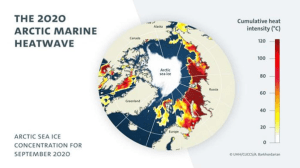TAG: GS 1: GEOGRAPHY
THE CONTEXT: A new study published in Nature Communications reveals a troubling trend in the Arctic Ocean, where marine heatwaves have occurred for six consecutive years from 2015 to 2021.
EXPLANATION:
- This analysis delves into the study’s findings, emphasizing the implications of these heatwaves on the Arctic ecosystem and the concerning impact on sea ice cover and biodiversity.
Escalation of Marine Heatwaves in the Arctic:
- Longitudinal Trend Since 2007:
- Since 2007, the Arctic Ocean has experienced 11 marine heatwaves, with a notable escalation observed from 2015 to 2021.
- A marine heatwave is defined when surface water temperatures exceed 95% of values from the past 30 years for at least five consecutive days.
- Record Temperature Increase:
- The average temperature during these marine heatwaves rose by 2.2 degrees Celsius above the seasonal average, indicating a significant warming trend.
- The years 2007 and 2020 marked critical events, with the latter being the most severe in terms of intensity and duration.
Impact on Arctic Sea Ice:
- Regime Shift Since 2007:
- A pronounced regime shift has occurred since 2007, transitioning from thicker and deformed ice cover to thinner and more uniform ice.
- Thicker, several-year-old ice has decreased, while the percentage of thin, seasonal ice is consistently increasing.
- Vulnerability of First-Year Ice Regions:
- Marine heatwaves primarily affect Arctic marginal seas, including the Kara, Laptev, East Siberian, Chukchi, and part of Beaufort Seas.
- These regions are predominantly covered by first-year ice, ranging from 0.3-2 meters in thickness, making them more susceptible to heatwave events.
- Solar Radiation Impact:
- First-year ice impedes thorough mixing between sea layers, preventing solar radiation from reaching lower parts of the sea.
- This results in unusually high sea surface temperatures, creating conditions conducive to marine heatwave events.
- Abrupt Sea Ice Retreat:
- Abrupt sea ice retreat is a concern, potentially triggering marine heatwave events.
- The rate of sea ice melt in June-July has increased, raising alarms about the speed of ice loss over the past 25 years.

Human-Induced Factors and Greenhouse Gas Forcing:
- Connection to Greenhouse Gas Emissions:
- The study links Arctic marine heatwave events to a record decline in Arctic Sea ice, especially in the years 2007, 2012, and 2020.
- Human-induced emissions, particularly greenhouse gases, are identified as key contributors to the emergence of marine heatwaves.
- Intensity and Probability Analysis:
- Events with intensities greater than 1.5°C could not occur without the involvement of greenhouse gases.
- The observed 2007, 2012, and 2020 events recorded intensities of 3.5°C, 2.1°C, and 4°C, respectively, showcasing the impact of human-induced warming.
- Warning on Persistent Recurrence:
- Moderate marine heatwave events with intensity between 0.5-1°C may persistently recur if greenhouse gas forcing continues to rise, posing ongoing threats.
Environmental Consequences and Ecosystem Impact:
- Dramatic Consequences Predicted:
- The study’s authors warn of dramatic consequences, including potential collapse of food chains, reduction in fish stocks, and an overall decline in biodiversity.
- Human-Induced Warming and Marine Heatwaves:
- The severity and duration of the 2020 marine heatwave, with a probability of less than 1% without human-induced warming, underscore the role of anthropogenic factors.
Conclusion:
- The escalation of marine heatwaves in the Arctic, driven by human-induced warming and greenhouse gas emissions, presents a critical threat to the region’s ecosystem.
- The impact on sea ice, vulnerability of first-year ice regions, and potential consequences for biodiversity emphasize the urgent need for global efforts to mitigate climate change and address the specific challenges faced by the Arctic environment.

